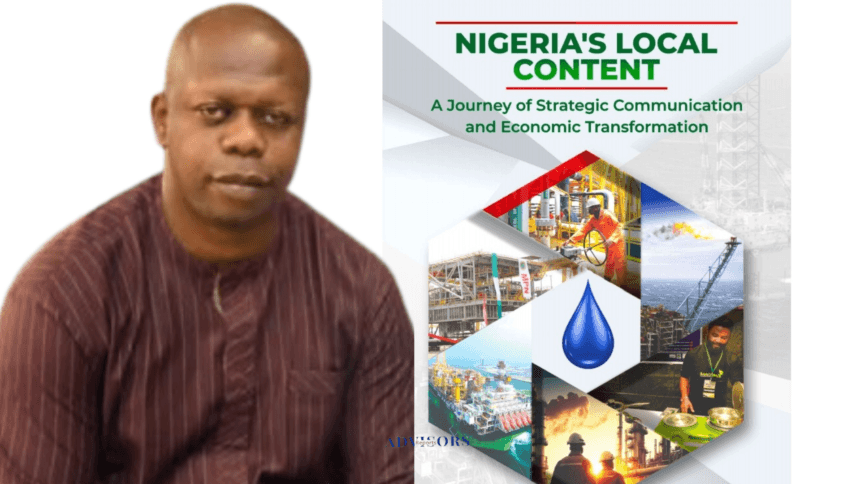Oredola Adeola
Dr. Obinna Ezeobi, Manager, Media & Publicity, at Nigerian Content Development and Monitoring Board (NCDMB), has unveiled a new book titled “Nigeria’s Local Content: A Journey of Strategic Communication and Economic Transformation.”
The new publication, which has just been introduced to the reading public, captures some of the thrills and highlights of the local content policy in Nigeria.
The new book comes at a time when stakeholders in the country’s oil and gas industry are preparing to mark 15 years of the enactment and implementation of the Nigerian Oil and Gas Industry Content Development (NOGICD) Act.
Advisors Reports gathered that the book provides a detailed account of how deft communication initiatives, skillful stakeholder management strategies, and effective collaboration among key players in the oil sector played pivotal roles in propagating and advancing Nigeria’s local content policy.
These efforts, as documented in the Dr.Ezeobi’s book, has helped elevate the policy to a national agenda and influenced several other countries across the African continent.
The book, written in fast-paced and easily accessible vocabulary, has received endorsements from notable personalities in the Nigerian and African energy sectors.
Among them is the pioneer Executive Secretary of NCDMB, Dr. Ernest Nwapa, who penned a riveting foreword.
Dr. Omar Farouk Ibrahim, Secretary General of the African Petroleum Producers Organisation (APPO), endorsing the book, recommended it to policymakers and local content enthusiasts across the continent and beyond.
Engr. Emeka Ene,, the Chairman of Oildata Group and former Chairman of the Petroleum Technology Association of Nigeria (PETAN), on his part lauded the publication for chronicling key local content success stories, while highlighting the important roles played by advocacy and stakeholder engagement in Nigeria’s local content journey.
Engr. Felix Omatsola Ogbe, the Executive Secretary of NCDMB, who received a copy of the book on Monday in Abuja, commended Dr. Ezeobi for his efforts in documenting and projecting the local content story.
He praised the aesthetics and quality of the book and pledged that the Board would procure copies for wider dissemination.
Advisors Reports gathered that the 267-page book is divided into five parts, each focusing on different but interconnected themes such as the evolution of the oil and gas industry and local content, as well as contemporary issues like the impact of oil company divestments and Presidential Directives on local content development.
Noteworthy sections include case studies on the Nigerian Content 10-Year Strategic Roadmap and key initiatives that were enabled through strategic communication and stakeholder engagement. The book concludes with a treatise on local content compliance and enforcement, as well as findings from an empirical study on the impact of Nigerian content communications on compliance by oil and gas companies.
The publication reflects the author’s background in media, his career at the NCDMB, and his doctoral studies in Energy Communication.
Speaking on his motivation for writing the book, Dr. Ezeobi emphasized that the Nigerian Content Act is one of the most impactful and transformational legislations since Nigeria’s return to democracy in 1999—principally due to how NCDMB and its partners deployed public communication and stakeholder management strategies in its implementation.
He noted that he was inspired to document and tell the remarkable local content story from the perspective of communication and stakeholder engagement, having played key roles in conceptualising and implementing impactful strategies since the agency’s inception in 2010.
The book targets a broad audience, including oil and gas players, local content actors, communication professionals, scholars, regulatory agencies, development partners, host community members, and historians. Dr. Ezeobi hopes the publication will enable various stakeholders to better understand the local content policy, learn how the models are implemented and communicated, and possibly replicate them.
This, he believes, will help ensure—as Dr. Omar Farouk Ibrahim noted in his endorsement—that “we derive maximum value from our natural resources, create jobs for our people, and develop our economies.”




